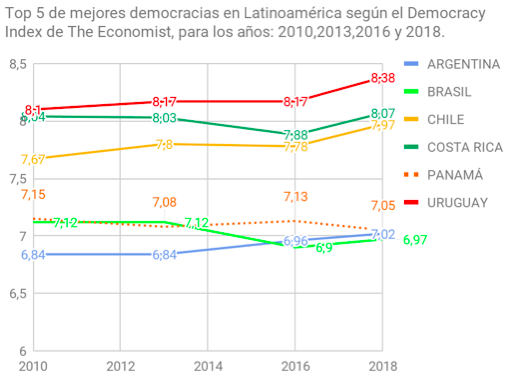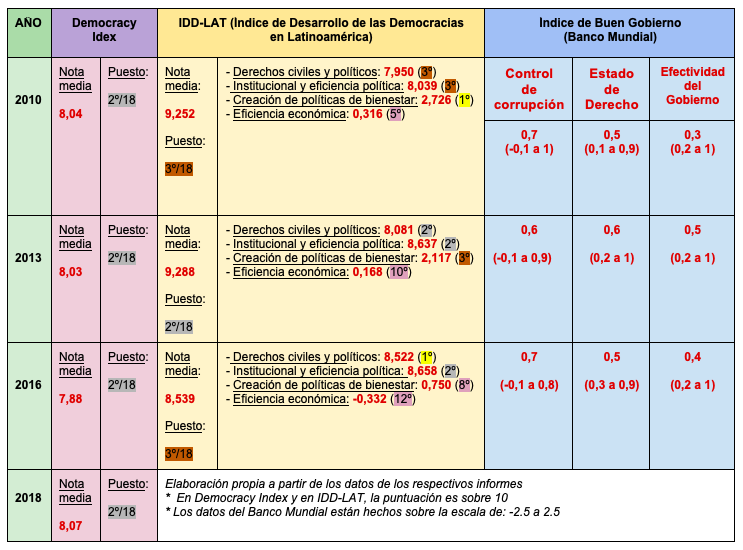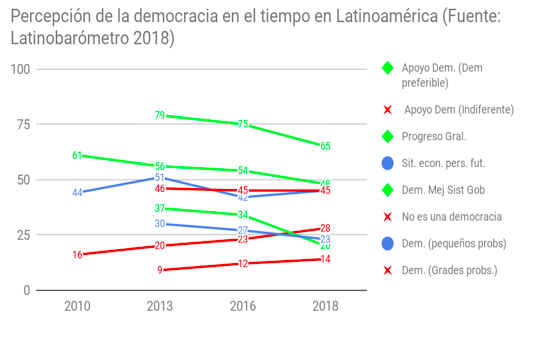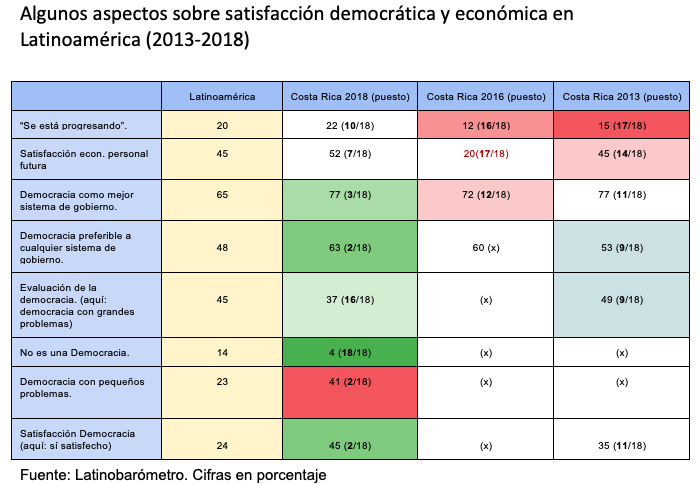Ruta de navegación
Menú de navegación
Blogs
Entries with label carlos alvarado .
The deterioration of recent years seems to have been corrected in several indicators on democratic health and economic environment.
Costa Rica has traditionally been a model of democratic functioning in a region with serious institutional deficits, which has earned it a mediating role in different conflicts. The increase of internal problems -strikes, citizen protests, bipartisan crisis...- have seemed to have diminished Costa Rica's international prestige in recent years. Is Costa Rica suffering from democratic and institutional deterioration?
![Facade of the National Theater of Costa Rica, in San José [Pixabay]. Facade of the National Theater of Costa Rica, in San José [Pixabay].](/documents/10174/16849987/costa-rica-deterioro-blog.jpg)
▲ Facade of the National Theater of Costa Rica, in San José [Pixabay].
article / Ramón Barba
The political unrest of recent years in Costa Rica, in a regional context of the "angry vote" and the consequent "outsider phenomenon", has given the impression of a setback in the country's institutional virtues. The goal of this article is to determine, based on different indicators on democratic health and economic and political satisfaction, if there are objective data that ratify this perception.
For this purpose we will first analyze a set of indicators, elaborated by the World Bank, the Konrad Adenauer Foundation and The Economist magazine, and then we will also take into account some results of the survey Latinobarómetro. We will compare the values recorded in 2010, 2013, 2016 and, when possible, 2018.
Indicators
Regarding the Democracy Index elaborated by The Economist, although Costa Rica maintains its second place among Latin American democracies, behind Uruguay and ahead of Chile (these are the three countries that usually obtain better grade in the different institutional parameters of the region), in the last decade a Costa Rican democratic decline is observed, apparently overcome in the most recent report. From a score of 8.04 achieved in the 2010 Democracy Index, Costa Rica dropped to 8.03 in 2013 and 7.88 in 2016, to regain ground in 2018 with an 8.07. The country remains the best democracy in Central America, followed at a distance by a stable Panama.
 |
The deterioration of recent years has also been picked up by the Index of development of Democracies in Latin America (IDD-LAT), of the Konrad Adenauer Foundation, which has not yet published data referring to 2018, so this index cannot endorse whether there has been a recent recovery. In 2010, Costa Rica had a score average of 9.252; it barely varied in 2013, with a figure of 9.277, but dropped clearly in 2016, with 8.539 points. The components of the index that suffered the most were welfare policy creation and economic efficiency, where it dropped from 1st and 5th place, respectively, to 8th and 12th. The fact that Costa Rica remained between 1st and 3rd place in civil and political rights and in institutional and political efficiency in those years sample shows that the social concern of those years was more in the economic sphere than in the institutional sphere.
The World Bank's Good Governanceindicators also registera small regression in the case of Costa Rica between the years 2013 and 2016 (data more recent ones have not yet been published). Regarding the Rule of Law and Government Effectiveness scales the score dropped from 0.6 and 0.5, respectively, to 0.5 and 0.4. There has been little change in the Control of Corruption scale.
 |
evaluation citizen
The above indicators are prepared by experts who, by applying standardized criteria, seek to offer an objective estimate. But we also wanted to take into account the opinion of the citizens themselves, as expressed in the survey Latinobarómetro. These can be useful to indicate the perception that exists among the population regarding the institutional health of the country: the satisfaction that exists regarding the government system and the economic system.
 |
The value of democracy is maintained in high percentages in Costa Rica, despite a negative trend in the region as a whole. Attending to four values that Latinobarómetro has included in its surveys corresponding to the years here chosen for our comparison, we see that indeed in 2016 the citizen perception was that of a worsening of status, but in 2018 an improvement is observed, reaching even more positive levels than in 2013. As for the evaluation of democracy, its consideration as the best system of government dropped from 77% to 72% and then has risen again to 77%, while its cataloging as a preferable system has been increasing: 53%, 60% and 63%.
The perception of the economic environment, for its part, had a blip in 2013, but today it is in better condition. The statement "progress is being made" fell from 15% to 12%, but in 2018 it reached 22%, while satisfaction with future personal economic prospects fell from 45% to 20% to stand in 2018 at 52%.

Political unrest
Costa Rica is a country that retains strong institutions, although the political landscape is more divided. test of this is the end of the two-party system (1953-2014), brought about by less support for the National Liberation Party (PLN) and the Social Christian Unity Party (PUSC) and the emergence of the Citizen Action Party (PAC), to which the country's current president, Carlos Alvarado, belongs.
Corruption issues such as the "cimentazo case", the high public debt that has forced cutbacks in a country with certain well-established social benefits and a regional and international environment prone to populist solutions may be behind the political unrest observed in Costa Rica in recent years.
This occurs in a context of the "angry vote" in Latin America, which arises as a consequence of the political actions of the last twenty years in the region and a strengthening of the middle classes. Citizen dissatisfaction has led to the emergence of outsider politicians: people with relative popularity, short degree program political, without a determined strategy and with an "anti-political" speech . This is a patron saint that, although it is in the emergence of the PAC, in any case does not fully correspond to the personality of President Alvarado, who actually seems to have contributed to redirect the Costa Rican restlessness.
Conclusions
Thus, from the analysis of the data observed here, it can be concluded that there was indeed a slight deterioration in both institutional circumstances and especially in economic conditions or expectations between 2013 and 2016, but the different scales have returned in 2018 to previous values, even improving in some cases to levels of ten years ago. This is something that can be observed both in the indicators at position of experts that follow standardized objective procedures and in the surveys of subjective citizen perception.
The sample used and the temporal tastings carried out have not been exhaustive, so it is not possible to specify whether the variations noted here are circumstantial fluctuations or part of a trend pointing in a certain direction.
